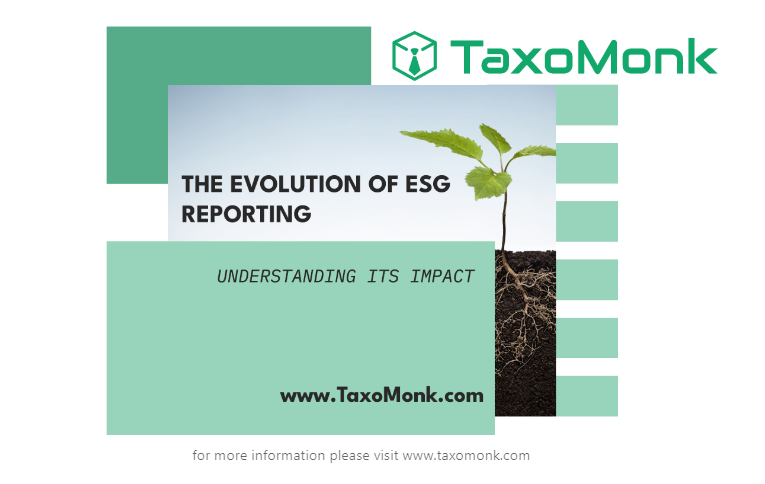Introduction:
Understanding the Evolution and Impact of (ESG) Reporting: Environmental, Social, and Governance (ESG) reporting has emerged as a pivotal tool for companies in the United Kingdom to demonstrate their commitment to sustainable and responsible business practices. Over the past few decades, there has been a significant shift in the way businesses operate, with a growing recognition of the importance of not only financial performance but also their impact on the environment, society, and governance structures. This article delves into the evolution, significance, and impact of ESG reporting in the UK, exploring how it has become an integral aspect of corporate transparency and accountability.

Understanding the Evolution and Impact of ESG Reporting:
The concept of ESG reporting has its roots in corporate social responsibility (CSR) initiatives, which gained prominence in the late 20th century. Initially, CSR primarily focused on philanthropic activities and compliance with regulations. However, as societal expectations evolved, so did the approach to corporate responsibility. In the early 21st century, there was a growing emphasis on sustainable development, prompting companies to consider the environmental and social impacts of their operations.
The Global Reporting Initiative (GRI), founded in 1997, played a significant role in shaping the landscape of ESG reporting by introducing standardized guidelines for sustainability reporting. These guidelines provided companies with a framework to measure and disclose their performance across various ESG metrics, thereby enhancing transparency and comparability.
In the UK, the government and regulatory bodies have also played a crucial role in promoting ESG reporting. The Companies Act 2006 introduced requirements for companies to disclose non-financial information, including environmental and social matters, in their annual reports. Additionally, initiatives such as the UK Stewardship Code and the Carbon Disclosure Project have further incentivized companies to enhance their ESG disclosures.
Key milestones in the evolution of ESG reporting include:
- 1990s: Emergence of Corporate Social Responsibility (CSR) initiatives focusing on philanthropic activities and community engagement.
- 2000s: Introduction of global reporting standards such as the Global Reporting Initiative (GRI) and the Carbon Disclosure Project (CDP).
- 2010s: Integration of ESG factors into investment decisions, with frameworks like the Sustainable Development Goals (SDGs) and the Paris Agreement shaping corporate policies.
- 2020s: Increased regulatory requirements and standardization efforts, such as the EU Taxonomy for sustainable activities and the Task Force on Climate-related Financial Disclosures (TCFD).
Significance of ESG Reporting:
ESG reporting is significant for several reasons. Firstly, it allows companies to assess and manage their environmental and social risks, thereby safeguarding their long-term sustainability. By identifying areas for improvement, companies can implement strategies to mitigate risks, enhance operational efficiency, and drive innovation.
Secondly, ESG reporting is increasingly demanded by investors, stakeholders, and consumers who are placing greater importance on sustainability and ethical business practices. Investors are recognizing that ESG factors can have a material impact on financial performance and are integrating these considerations into their investment decisions. Moreover, stakeholders and consumers are holding companies accountable for their actions and are more likely to support businesses that demonstrate a commitment to ESG principles.
Furthermore, ESG reporting enhances corporate reputation and brand value. Companies that are transparent about their ESG performance are perceived as trustworthy and socially responsible, which can lead to increased customer loyalty and stakeholder engagement. Conversely, failure to address ESG issues can result in reputational damage, legal liabilities, and financial losses.
ESG reporting has profound implications for businesses and their stakeholders:
- Enhanced Transparency and Accountability: ESG reports provide insights into a company’s ethical practices, fostering trust and credibility.
- Investor Confidence: Investors use ESG data to assess risks and opportunities, influencing investment decisions and access to capital.
- Regulatory Compliance: Adhering to ESG standards ensures compliance with evolving regulations and mitigates legal risks.
- Competitive Advantage: Companies with strong ESG performance can differentiate themselves, attracting customers and talent.
- Risk Management: Identifying ESG risks allows companies to develop strategies to mitigate them, ensuring long-term sustainability.
Impact of understanding ESG Reporting:
The impact of ESG reporting in the UK has been profound, influencing corporate behavior, regulatory frameworks, and societal expectations. Companies are increasingly integrating ESG considerations into their business strategies, decision-making processes, and performance evaluations. This shift towards sustainable and responsible business practices is not only driven by regulatory requirements but also by the desire to create long-term value for all stakeholders.
Moreover, ESG reporting has facilitated greater transparency and accountability within the corporate sector. By disclosing ESG performance data, companies are held accountable for their actions and are incentivized to improve their practices. This transparency fosters trust and credibility among stakeholders, leading to stronger relationships and partnerships.
From a regulatory perspective, ESG reporting has prompted governments and regulatory bodies to enact policies and standards that promote sustainability and responsible governance. For example, the UK government has introduced various initiatives to encourage ESG reporting, such as the Task Force on Climate-related Financial Disclosures (TCFD) and the Modern Slavery Act.
How TAXOMONK Can Assist
1. Expertise in ESG Reporting Standards for Understanding the Evolution and Impact of (ESG) Reporting:
TAXOMONK offers expertise in various ESG reporting standards and frameworks. The company can guide businesses and Chartered Accountant firms in understanding and applying standards such as GRI, CDP, TCFD, and the EU Taxonomy. This ensures that reports are comprehensive, comparable, and aligned with international best practices.
2. Customized ESG Strategy Development
TAXOMONK helps businesses develop tailored ESG strategies that align with their unique goals and industry requirements. By conducting materiality assessments, TAXOMONK identifies the most relevant ESG factors for the company, ensuring that reporting focuses on areas of greatest impact.
3. Data Collection and Analysis
Accurate ESG reporting requires robust data collection and analysis. TAXOMONK assists in setting up efficient data collection processes, integrating ESG metrics into existing reporting systems, and performing thorough data analysis to ensure accuracy and completeness.
4. Training and Capacity Building
For Chartered Accountant firms, staying updated with ESG reporting standards is crucial. TAXOMONK provides training programs and workshops to enhance the knowledge and skills of accounting professionals, enabling them to better support their clients in ESG reporting.
5. Stakeholder Engagement and Communication
Effective ESG reporting involves engaging with various stakeholders, including investors, regulators, employees, and customers. TAXOMONK assists in developing communication strategies to effectively convey ESG performance and initiatives, fostering transparency and stakeholder trust.
6. Continuous Improvement and Reporting
ESG reporting is an ongoing process that requires continuous improvement. TAXOMONK supports businesses in setting targets, monitoring progress, and regularly updating ESG reports to reflect new developments and achievements. This ensures that ESG reporting remains dynamic and responsive to changing stakeholder expectations.
Conclusion:
In conclusion, Understanding the Evolution and Impact of (ESG) Reporting has become an essential tool for companies in the UK to demonstrate their commitment to sustainability, responsibility, and transparency. As the world faces increasingly complex environmental, social, and governance challenges, businesses have a critical role to play in driving positive change. ESG reporting not only enables companies to assess and manage their impacts but also enhances stakeholder trust, investor confidence, and long-term value creation. Moving forward, it is imperative for companies to embrace ESG principles and integrate them into their core business strategies to thrive in a rapidly changing and interconnected world. Visit our website Taxomonk www.taxomonk.com today which is Premier Outsourcing service provider. Book your free trial and Contact us.
For more blogs visit Blogs & Articles section.





Leave a Reply